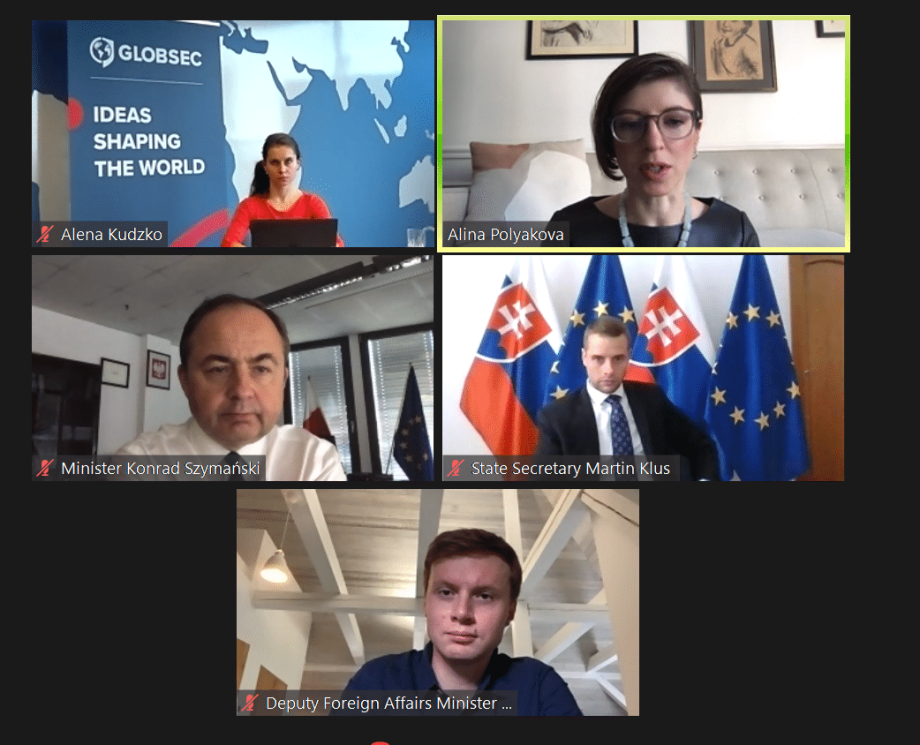The V4 European and Transatlantic Priorities in the Post COVID-19 Environment

The V4 Priorities Post COVID-19: The European Union (EU) and the Visegrad countries (V4) economic response to the COVID-19 pandemic, the Conference on the Future of Europe, the transatlantic relations, and the geopolitics in the post-COVID-19 world were the key topics of the discussion organized by GLOBSEC and the Center for European Policy Analysis (CEPA) on 25 June 2020.
Below we present the key points from the discussions:
- The COVID-19 crisis has revealed and amplified the interdependence of the countries in the EU, despite the distance between them and their geographical location. It is in the interest of the V4 to provide proactive, constructive input into the debate on the economic recovery in the aftermath of the immediate health crisis. The same approach should be applied during the debate on the development of the stance on the EU’s global role and its relations with global powers.
“COVID19 crisis has come when we were already facing many global challenges and unresolved issues in the EU. This health crisis might become a wake-up call to provide a united solution to the crises in future” - Aleš Chmelař, Deputy Minister for Europe of the Czech Republic
The EU and V4 economic response to the COVID-19 pandemic:
- The Visegrad (V4) countries were more prepared to face the COVID-19 pandemic, as it reached the region later than in another part of Europe.
- The economic impact of the pandemic still remains unclear and has not yet become structural. At the same time, we are quickly moving to a situation where some of the changes might not be reversible. The structural changes in the value chain will have a strong impact on the V4 region, which is being a manufacturing force in the EU.
- Despite the differences between V4 countries’ stances on the current budget and recovery fund negotiations, the countries have reached common grounds and call on European partners to have more trust, more time and more flexibility in the ongoing negotiation process.
“We are heavily dependent on each other and we need a common European response. We understand that when something affects Italy and Spain, we also feel it immediately in Central Europe” – Martin Klus, State Secretary for European Affairs of Slovakia
The Conference on Future of Europe (FoE Conference):
“The FoE Conference will be an important topic of the German Presidency and we are ready to contribute. But I am not positive that we are ready to find a compromise on the opening of the Treaties” – Martin Klus, State Secretary for European Affairs of Slovakia
- The V4 countries are positive about the idea of the launch of the process and ready to actively contribute to it.
- To be successful, the Conference has to become a multistakeholder exercise, including stronger role of the national parliaments.
- Slovakia and the Czech Republic are sceptical about the possibility to find a compromise on the opening of the Treaties, as this process could amplify the existing divisions within the EU.
- Contrary, Poland calls not to predefine any conclusions on the Conference on the Future of Europe and not have any taboos, including the Treaties, changing.
“We should not predefine any conclusions on the Conference on the Future of Europe and not have taboos like Treaties changing. There should be a stronger involvement of national parliaments and broad public” - Konrad Szymański, Minister for European Affairs of Poland.
The transatlantic relations and the geopolitics in the post-COVID-19 world:
“We need the debate and a common European position on China to avoid the divide-and-rule strategy, and I hope the German Presidency will provide for this” - Aleš Chmelař, Deputy Minister for Europe of the Czech Republic
- The EU should have a strong unified position in China, in order to avoid the divide-an-rule strategy.
- There is no functioning alternative to transatlantic relations. Despite the current challenges to the transatlantic ties, it is in the common interest of all partners to find common ground and fight for the unity of the West.
“Poland is one of the countries which believes that the transatlantic ties are not for granted. We need to consolidate the unity of the West, whatever political changes are happening, be it in the EU or NATO capitals” - Konrad Szymański, Minister for European Affairs of Poland.
The speakers of the webinar titled ‘Central European Priorities in the Post Covid-19 Environment’ included: Aleš Chmelař, Deputy Minister for Europe of the Czech Republic, Martin Klus, State Secretary for European Affairs of Slovakia and Konrad Szymański, Minister for European Affairs of Poland. The discussion was introduced by Alina Polyakova, President and CEO and led by the Director of GLOBSEC Policy Institute Alena Kudzko.
This online event was held under the framework of GLOBSEC’s campaigns #Hub4Europe and #PrimeTime.